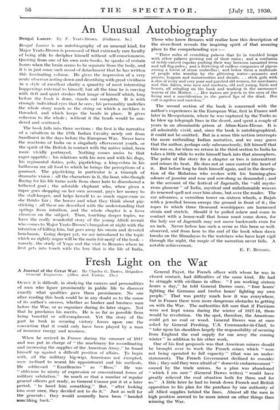An Unusual Autobiography
Bengal Lancer. By F. Yeats-Brown. (Gollanez. 9s.) Ltengal Lancer is an autobiography of an unusual kind, for Major Yeats-Brown is possessed of that extremely rare faculty of being able to decipher himself without self-consciousness. Quoting from one of his own note-books, he speaks of certain hours when the brain seems to be separate from the body, and it is in just some such mood of detachment that he has written this fascinating volume. He gives the impression of a very acute observer noting down and describing with great vividness in a style of excellent clarity a quantity of most interesting happenings external to himself, but all the time he is carving with deft and quiet strokes that image of himself which, long before the book is done, stands out complete. It is with strongly individual eyes that he sees ; his personality underlies the whole story much as the string on which a necklace is threaded, and which keeps the beads in place. It gives cohesion to the whole ; without it the beads would be sun- dered and scattered.
The book fulls into three sections : the first is the narrative of a subaltern in the nth Indian Cavalry newly out from Sandhurst in the days before the European War. Never have the reactions of India on a singularly effervescent youth, or the spirit of the British in contact with the native mind, been more vividly portrayed. Nothing comes amiss to that eager appetite : his relations with his men and with his dogs, his regimental duties, polo, pigsticking, a king-cobra in his bathroom are all food to which he brings the perceptions of a gourmet. The pigsticking in particular is a triumph of dramatic vision : all the characters in it, the boar, who though fleeing for his life turns aside front sheer hate to disembowel a tethered goat ; the adorable elephant who, when given a rupee goes shopping on her own account, pays her money to the stall-keeper, and helps herself to as much sugar-cane as she thinks fair ; the horses and what they think about pig- sticking : all these arc described with the understanding that springs front intuition, and the whole chapter is a locus classless on the subject. Then, touching deeper topics, we have the really wonderful story of the young Afridi recruit who comes to Major Yeats-Brown's bungalow at night with the intention of killing him, but goes away his sworn and devoted henehman. Going deeper yet, we are introduced to the topic wh his we rightly augur will be the main -motif of the book— namely, time study of Yoga aml the visit to Benares where he first gets into touch wills the lore that is the life of India. Those who know Benares will realize how this description of the river-front reveals the inspiring spirit of that amazing place to the comprehending eye :—
" Three miles of crumbling palaces that lie in tumbled heaps with other palaces growing out of their ruins ; and a confusion of richly-carved cupolas pushing their way between tamarind trees and tall flag-poles ; and a fluttering of endless companies of pigeon among a forest of straw umbrellas ; and below them a multitude of people who worship by the glittering water—peasants and priests, beggars and monstrosities and dwarfs. . . sleek girls with a skin of ivory and very poor and parched old womon, fat merchants and thin fakirs, wise men and madmen, old and young, birds and beasts, all mingling on the bank and washing in the sacrosanct waters of the Mother. . . Hor waters are jewels to the eyes of the living and a sanctification to the parted lips of the dead. Her cult is ageless and casts-less."
The second section of the book is concerned with the author's experiences in the European War, first in France and later in Mesopotamia, where he was captured by the Turks as he blew up telegraph lines in the desert, and spent a couple of years in an abominable prison at Affitn-Kara-Hissar. It is all admirably vivid, and, since the book is autobiographical, it could not be omitted. But in a sense this section interrupts the more enthralling Indian narrative, and we may guess that the author, perhaps only subconsciously, felt himself that this was so, for when we return in the third section to India he takes a little while to write himself back into that atmosphere. The pulse of the story for a chapter or two is intermittent and misses its beat. He does not at once control the heart of it. But before long he finds himself again, and in the descrip- tion of the Mahatma who evokes with his burning-glass odours of jasmine and rose and cow-dung as demanded ; and in the account of the festival of Jagenath, the "old myste- rious glamour" of India, mystical and unfathomable weaves its renewed spell not over him alone, but over the reader. The car advances, a vermilion tower on sixteen wheels, a Rajah with a jewelled broom sweeps the ground in front of it ; the ropes to which three thousand worshippers are harnessed strain and stretch. Should it be pulled askew and come in contact with a house-wall that house must come down, for the holy car of Jagenath may not move backwards even for an inch. Never before has such a scene as this been so well- observed, and from here to the end of the book when dawn breaks on the Himalayas to the watchers who have kept vigil through the night, the magic of the narration never fails. A notable achievement.
E. F. BENSON.




































 Previous page
Previous page